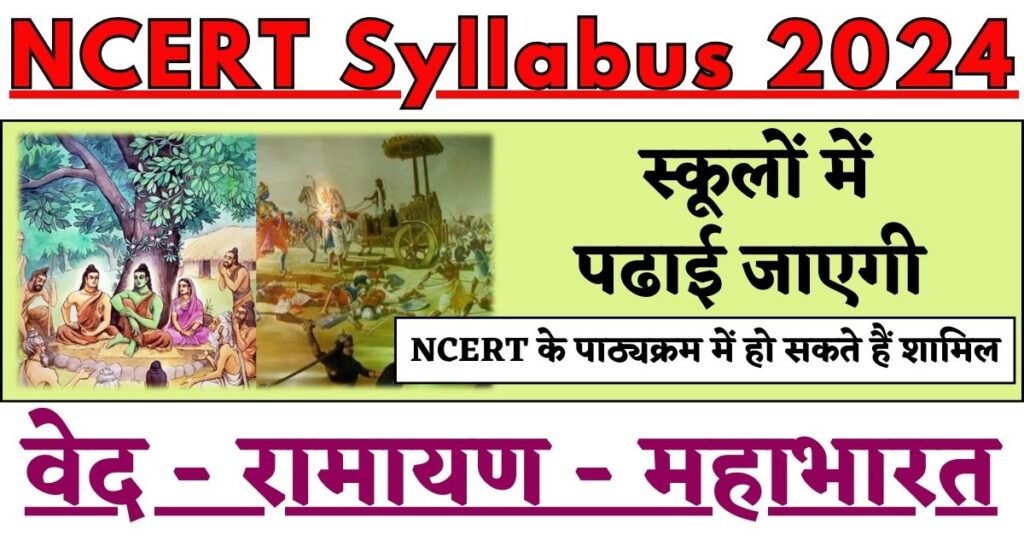|New| NCERT Syllabus 2024: The National Council of Educational Research and Training (NCERT) panel has suggested that epic and sacred texts like Ramayana, Mahabharata, and Vedas should be included in the history curriculum of students under the ‘Classical Period’ of India. The panel has made several recommendations regarding changes in the syllabus of the social science subject. NCERT is revising the school curriculum per the National Education Policy (NEP) 2020.
The administration of NCERT has formed a new committee for the syllabus changes. As per the news, there are a total of 19 members on the commission. The NCERT 19-member National Curriculum and Teaching-Learning Materials Committee (NSTC) which aims to stabilize the curriculum, textbooks, and learning materials for these classes. As per the committee chief C. I Isaac (the chairman of the committee, “The committee has recommended the introduction of the Indian Knowledge System (IKS) in the curriculum of all subjects.
Social Science NCERT Syllabus 2024
The panel has also suggested that the Preamble of the Constitution be written on the walls of all classrooms in the local languages of the department, the committee chairman, Professor C I Isaac, told ANI over the phone. The Social Sciences Committee of the Council of Educational Research and Training (NCERT), which has been formed to revise the social science curriculum for schools, has made several proposals, including the inclusion of Indian knowledge systems, Vedas, and Ayurveda in the curriculum. Has been suggested. The suggestions have been part of your previous Social Sciences Term Paper, an important approach document that helps in the development of new NCERT courses on the subject. This proposal has not yet received final approval from NCERT.
DS-160 Form Online Apply 2023, Eligibility, USA Visa Sample form, Step by Step Guide @ceac.state.gov
CBSE Budding Authors Program: Become a Writer, Join & Get a Chance to Publish Your Work
As per the panel: Indian history is classified into 4 parts
The panel has suggested that history be classified into four eras: the ancient period, the medieval period, the British period, and modern India. “Till now, Indian history has been divided into only three segments – ancient, medieval, and modern India,” Isak, a retired history professor, said. Within the Classical period, we have suggested that the Indian epics – the Ramayana and the Mahabharata – should be taught. As per the newly formed NCERT panel, “Every student should know about lord Rama and the story of Ramayana. The student should know to moral values of Indian history epics. Learning about history will build the student’s character in a good way.
| Indian History 4 Part Classification | |
| Ancient Period | Medieval Period |
| British Period | Modern India |
Aims and Objectives of This Step
The main aim of this step is to align the school curriculum with the National Education Policy (NEP) of 2020. By encouraging classroom-to-classroom engagement, interscholastic embedding, and aligned themes in social sciences, the committee aims to create teacher handbooks by February 25, 2024.
National Council of Education Research and Training
The National Council of Educational Research and Training (NCERT) is an autonomous organization established by the Government of India in 1961 with the objective of advising the Central and State Governments on policies and programs for quality improvement in school education. The main objectives of NCERT and its federated units are: To undertake, encourage, and co-ordinate research in areas relating to school education; To prepare and publish model textbooks, supplementary materials, newspapers, magazines and didactic kits, multimedia digital content, etc.
NCERT conducts pre-service and in-service capacity training of teachers; Develops and disseminates innovative teaching techniques and practices; Collaborates and networks with state educational departments, universities, non-governmental organizations, and other educational institutions, The Vidyalaya serves as a clarification center for ideas and information on issues related to education. Apart from research, development, training, extension, publication, and dissemination, NCERT is also a sponsoring organization for cultural exchange programs with other countries in the field of school education.
CBSE Date Sheet 2024:CBSE class 10th, 12th timetable
JEE Mains 2024 Syllabus [New]: List of Removed Topics Physics, Chemistry & Maths
National Education Policy
The National Education Policy (NEP) 2020 envisions a paradigm shift in education – “an education system that is rooted in Indian soil and directly supports India. India, into a knowledge society resulting in contributing to making India a global knowledge powerhouse by providing high-quality education to all, without inequality. The education policy places special emphasis on developing the creative potential of every individual. Its fundamental principle is that education should develop not just mental abilities – such as ‘fundamental‘ abilities in reading and mathematics and ‘higher‘ mental abilities, such as critical thinking and problem-solving – but also social, moral, and emotional abilities. Ideals should also evolve.
National Educational Policy Vision
This National Education Policy dreams of an education system that is in line with the fundamental principles of Indian ethos and directly contributes to making India an equitable and vibrant knowledge society, by providing high-quality education to all. By providing education, and thereby making a direct contribution to making India a global knowledge power.
At all stages, experiential learning will be adopted, including hands-on learning, art enrichment, play-enrichment pedagogy, story-richness-based pedagogy, etc., as standard learning in each subject and across different subjects. To reduce the educational gap, the classroom will change towards spontaneity-based learning and education, establishment-based education, towards boundary-based education.

